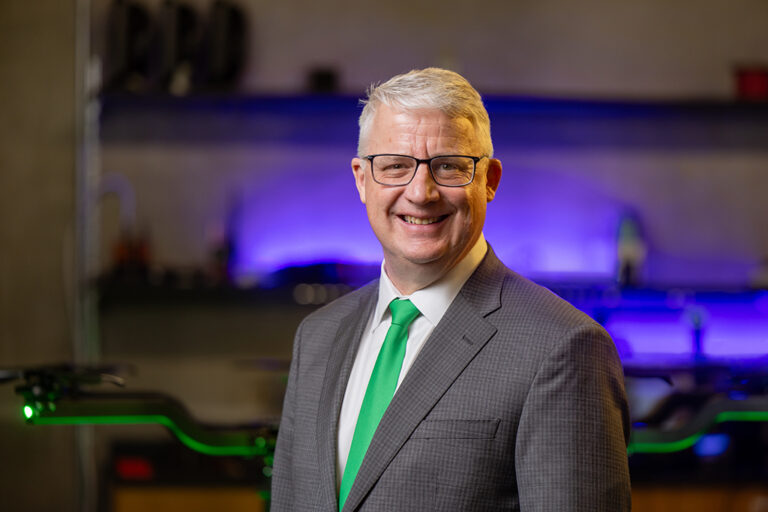In search of ‘intellectual souvenirs’
UND Atmospheric Sciences researcher is one of many faces temporarily leaving campus to bring back advanced work and knowledge

Gretchen Mullendore is one of those people who doesn’t run from disasters—she embraces them.
The UND associate professor of atmospheric sciences’ research blows past wind speeds and rain gauges to discover how severe weather actually works.
“It’s very hard to open up a storm. If you care about how a clock works, or how a radio works, you can open it up and look inside. But how do we look inside a big storm, particularly when it’s really violent inside?” Mullendore mused.
Like the inner workings of a clock or a radio, Mullendore’s research has many pieces. One question she must answer to bring the pieces together is how mid-latitude convection—like convection in North Dakota—differs from tropical convection. And to find that answer, she’ll need some time away from campus.
Mullendore is one of 13 UND faculty members who have been approved for developmental leave opportunities in the coming academic year. The first part of her sabbatical will allow her to spend three months at Texas A&M University as a visiting scientist.
“I’m going to be collaborating with scientists who do more tropical work. I do a lot of mid-latitude work, so we can bring our theories together and learn from each other,” she explained.
Mullendore will also sit in on tropical meteorology classes—both undergraduate and graduate—in hopes of developing those courses back at UND. From there, it’s off to the University of Melbourne in Australia, where Mullendore will continue research toward a unified convective theory, but also gain more knowledge in turbulence due to convection and how storms affect aviation hazards.
“As air traffic has become more and more global, it’s now typical for people to fly across the oceans. As part of that traffic, we have a lot of planes flying over tropical areas—even if they’re not going to tropical places,” Mullendore said. “We don’t have very good observations of the kind of hazards that planes experience over the open oceans, particularly in tropical areas.”
Developmental importance
It’s hard to be a pioneering scientist when one’s schedule is filled with class time, meetings and other University commitments. Mullendore says her leave will allow her to focus her energy on not only research and course development, but also writing grant proposals to bring research funding to UND.
But she looks forward to her return to campus, and the intellectual souvenirs she’ll share.
“The whole point of the University is to bring in ideas from all around the globe. We want our students to be able to experience the latest in research in all of the fields,” she said. “That might be the most important thing I’m bringing back—not classroom material or anything, just excitement for science and the newest research going on.”
“Gretchen is a phenomenal researcher and teacher,” said UND Provost and Vice president for Academic Affairs Tom DiLorenzo. “She is exactly the type of person we want to nurture and support through a developmental leave.”
DiLorenzo added that the University strongly supports being away from campus during developmental leave. “Faculty need some time to work in external archives or someone else’s laboratory and to learn new skills, so that they can grow their work and research and be more competitive in getting grants,” he said.
According to DiLorenzo, cancelling developmental leaves could have been an easy way to trim in a time of budget restraints. But he says the phenomenal quality of research and work that was completed last year helped the University decide that the program should carry on.
“In tight times, we should be spending money where our priorities are,” DiLorenzo said. “An important part of being a research university is having an opportunity to work on, update and extend one’s teaching and research capabilities. I am pleased to say we’re continuing to do that.”
World of research
Twelve other faculty members were also approved for developmental leaves. The following are partial summaries of what their leaves will allow them to accomplish:
- Xiaozhao Huang (English) – Huang will collaborate with scholars in China to collect data and analysis for research in the sociolinguistic use of Mandarin Chinese in particular social settings. He will also attend an academic conference that focuses on teaching English to non-native speakers, including K-12 students.
- Melissa Gjellstad (Languages) – Gjellstad will complete a manuscript and revise/renew a previously unpublished scholarship, as well as complete a monograph entitled, “Parental Parity: Mothers and Fathers in Millennial Norwegian Literature?”
- Emily Cherry (Theatre Arts) – Cherry will serve as a guest artist at Texas Wesleyan University and will direct one of their productions. She will collaborate with an award-winning actor and teacher regarding the pedagogy of teaching acting courses in a university environment.
- Michael Niedzielski (Geography) – Niedzielski will develop new concepts and models in the area of accessibility research. He also plans to develop instructional material for high school teachers about incorporating accessibility objectives in land use planning.
- Sean Valentine (Management) – Valentine will continue working on current research projects and start several new projects. He also plans to publish a 16th edition of a human resources textbook.
- Yun Ji (Chemical Engineering) – Ji will conduct research projects in the bio-based products area, including using lignin to make renewable fuels and chemicals. He will also conduct research in the water usage reduction area to benefit the pulp and paper industry and oil recovery industry.
- Reza Fazel-Rezai (Electrical Engineering) – Fazel-Rezai will expand his research in the area of brain-computer interface (BCI) systems.
- Sima Noghanian (Electrical Engineering) – Noghanian will travel to the University of California, San Diego, to expand her research in wireless communications.
- Deborah Worley (Education Leadership/Higher Education) – Worley will explore how culture is communicated by institutions of higher education through campus traditions with visits to other campuses.
- Kara Wettersten (Counseling Psychology) – Wettersten hopes to publish a curriculum titled “Friendships that Work”, a program currently geared for 5th-8th She will collaborate with the Community Violence Intervention Center (CVIC) and rural schools as a part of her research.
- Cheryl Hunter (Educational Foundations and Research) – Hunter plans to develop a new line of research in curricular models in doctoral education.
- Donna Pearson (Kinesiology & Public Health Education) – Pearson will study interculturalization as related to, and integrated into, teacher education and educational professional development.


